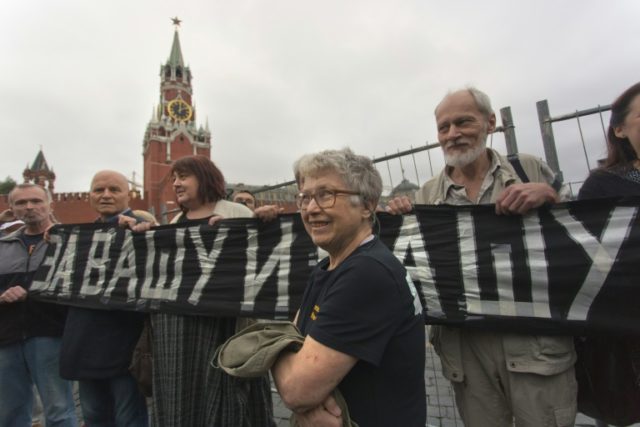Moscow (AFP) – In a symbolic gesture on August 25, 1968, that launched the political dissident movement, eight people demonstrated on Moscow’s Red Square against the Soviet authorities sending tanks into Prague.
Soviet troops had invaded the city five days earlier, bringing an end to the Prague Spring, a tentative attempt to liberalise the Communist system.
Standing in the square, they only had time to raise a few placards which read “Shame on the occupiers”, “For your freedom and ours” and “Long live free and independent Czechoslovakia” before being hauled in by the KGB secret police.
Most of those eight demonstrators — Natalya Gorbanevskaya, Pavel Litvinov, Viktor Fainberg, Vladimir Dremlyuga, Konstantin Babitsky, Larisa Bogoraz, Vadim Delaunay and Tatiana Bayeva — paid a high price for their protest.
Gorbanevskaya, a translator and poet, and art critic Fainberg were incarcerated in psychiatric hospitals — she for two years and he for five — and forcibly treated with antipsychotic drugs.
Dremlyuga, an electrician, and Delaunay, a poet, were sentenced to three years in prison camps in the far north and Siberia respectively.
Babitsky and Bogoraz, both linguists, and Litvinov, a physicist, were sent into exile for up to five years in villages in the Urals and Siberia.
Only Bayeva escaped punishment as she was just 21 and the others persuaded her to tell the KGB she had simply been walking past.
Five have since died.
In June, the Czech government handed the remaining three — Litvinov, Bayeva and Fainberg — an award to mark the 50-year anniversary of their protest.
Just months before her death in 2013, Gorbanevskaya, 77, told AFP: “We weren’t heroes or crazy. We simply wanted to act according to our consciences. I didn’t want to feel ashamed later because I had done nothing.”
“At noon, we held up our placards. Almost immediately, KGB agents in plainclothes jumped on us. They hit Fainberg so hard he was bleeding and broke several of his teeth,” she recalled.
“Litvinov also got hit in the face.”
– Fighting the propaganda –
The treatment of the protesters caused an outcry in the West, which the Soviet people only learnt of through illicitly tuning into Russian-language broadcasts by the BBC and Radio Liberty.
Such protests were incredibly rare in the USSR where the KGB kept the population under close surveillance.
There is no photograph of the Red Square protest — unless one exists in inaccessible KGB archives.
Nevertheless, the event was a catalyst for the nascent dissident movement.
According to Pravda, the Communist Party’s official newspaper, the Soviet move to crack down on the burgeoning reform movement in Prague was widely supported by workers, peasants and academics.
“The workers at the Hammer and Sickle plant are concerned at the events in Czechoslovakia,” the paper said on August 22, referring to Moscow’s huge metallurgical plant.
The workers “warmly supported” the decision by Soviet leader Leonid Brezhnev to help Czechoslovakia against the threat of “counterrevolutionary elements and their instigators in the imperialist camp,” Pravda wrote.
Speaking to AFP before her death, Gorbanevskaya said the protesters had wanted to show that not everyone backed the move.
“It was important for us to show that contrary to what the propaganda said, the Soviet people en masse did not all support the invasion of Czechoslovakia and some opposed it,” she said.
– ‘Brezhnev, get out’ –
While the Red Square protest was the most visible, it was not the only way Soviet people vented criticism.
At the time, Gorbanevskaya compiled an underground newsletter — “The Chronicle of Current Events” — which covered numerous other protests.
Some people sent open letters of support to the Prague reformers while others spoke out at work, despite the risk of losing their jobs.
Pamphlets and petitions criticising the invasion were also circulated in Moscow.
In Leningrad, now Saint Petersburg, a 20-year-old man was jailed for three years for writing on a wall: “Brezhnev, get the hell out of Czechoslovakia.”
Fifty years on, some in Russia still have little regard for the Prague Spring.
Last year, Zvezda newspaper, which is controlled by the defence ministry, published an article saying: “Czechoslovakia should be grateful to the USSR for 1968.”
It claimed the invasion prevented a Western coup d’etat that would have resulted in a “bloodbath.”
The Czech authorities took offence and Russia’s Prime Minister Dmitry Medvedev was forced to reiterate this was not Russia’s official position.


COMMENTS
Please let us know if you're having issues with commenting.